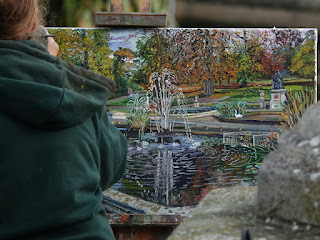A Cetti's Warbler was calling in the scrub to the east of the Lido swimming area. I got one hasty photograph of what I thought was it, but on closer inspection it turned out to be a female Blackcap, one of a few pairs that stay in the park all year round. Nevertheless, it was an unmistakable Cetti that I heard calling, probably the one that has been heard several times on the island.
The Coal Tit in the Flower Walk waited patiently while I photographed her before giving her the customary pine nut.
Two good pictures of Blackbirds from Mark Williams, a probable migrant in a pyracantha bush ...
... and a male singing loudly on Hampstead Heath, evidently a resident bird coaxed into song by the warm spell.
The Little Owl near the Speke obelisk was being awkward again, lurking behind a branch and then going into his hole when I moved to try to get a better angle ...
... but the young one at the Round Pond was as calm as ever, in spite of the many human visitors near his tree.
The Magpie pair beside the Long Water posed against an autumnal background.
A Jackdaw looking for insects beside the Serpentine looked annoyed when a pair of Egyptian Geese came ashore beside it.
A pair of Great Crested Grebes were fishing at the bridge until a Cormorant barged in and drove them away.
The pair of Mute Swans in the Italian Garden washed and preened under a fountain.
The male has been immortalised in a painting, sitting in his favourite spot. The four Cormorants in front of him seem a bit too many for the confined spaces of the pools, but this may be a bit of artistic licence.
Among the busy Shovellers on the Long Water two females rested side by side. It must be a relief to rest that heavy bill on your back.
Surprisingly, a late Brimstone butterfly appeared and landed on a bramble. They are usually the first butterflies we see in spring. Evidently they have more than one generation in a year.
A Buff-Tailed Bumblebee in the Rose Garden made a thorough job of feeding on a lavender flower. It spent at least five minutes going over all the florets.
A patch of salvia in the Dell attracted a few late Honeybees.


%202022%201a.jpg)
%202022%201a.jpg)








Congratulations to the swan. He has achieved immortality, of a sort, if only for being in the right place at the right time.
ReplyDeleteCettis are so frequent here whenever there is a bit of running water going on I sometimes forget that what is frequent here isn't necessarily the same everywhere. Frequent though they are, they are still darn difficult to see.
Tinúviel
Cettis have only been in this country since 1975. Now they abound at Rainham Marshes, where sometimes 50 have been reported in the reeds and scrub of the reserve. But in the centre of a city it's a different story, and we were surprised when one turned up a few years ago.
DeleteThe upper Blackbird is a first-winter male-maybe migrant, who knows? Still few here, though I did see an adult male on a local walk I was leading for the Ealing Wildlife Group yesterday.
ReplyDeleteBrimstones are only supposed to have the one generation a year. This male should be one that emerged in late summer. They usually feed up & then go into dormancy until the spring, though unseasonal temperatures (as we're currently experiencing) will bring them out as here. They have been recorded every month of the year but unusual in late autumn/winter. In these days of climate change things are changing so I guess the possibility of an extra generation could be possible, but don't believe it's ever been recorded (yet!).
Lovely sighting for you. I just saw Red Admiral & Small White yesterday.
Thanks for the information. Colder today and little to see in the insect line, just one Common Carder on the lavender.
DeleteThat brimstone is a great spot. Love the showering swans!
ReplyDeleteYou often see the swans at the edge of the fountain. A sprinkling of water helps preening, even when they are not having a major splash as here.
Delete